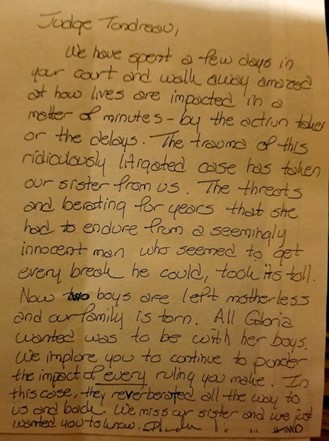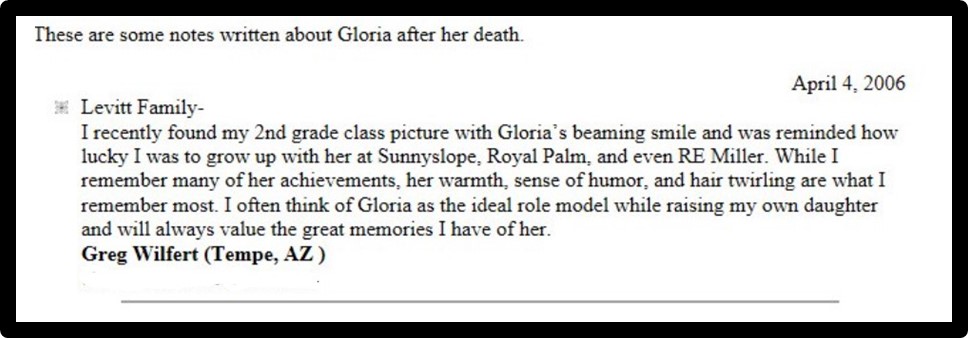
Death, Child Support and Attorney’s Fees in Silicon Valley

Warning: This reporting contains traumatic events which possibly could be triggering for some readers.
This is part five of the exclusive Vanguard investigative reporting series Tainted Trials, Tarnished Headlines and Stolen Justice. The series includes original reporting about the controversial, and secretive Santa Clara County Superior Court Bench, Bar, Media, and Police Committee (BBMP). To catch up: Part 1, Part 2, Part 3, Part 4.
By Robert J. Hansen and Susan Bassi
“Her only wish was to live a simple life in peace with her two sons.” Obituary for Gloria Levitt.
On an early spring day 17 years ago, witnesses observed a young woman pacing for several minutes on the San Antonio overpass above Highway 101 in the heart of Silicon Valley.  She stopped walking, climbed over the protective fencing, and lept from the bridge into full speed, oncoming traffic shortly before the evening commute began.
She stopped walking, climbed over the protective fencing, and lept from the bridge into full speed, oncoming traffic shortly before the evening commute began.
On March 24, 2006, Gloria Levitt (Hejna) committed suicide the day after she lost her job at Oracle while going through a contentious divorce.
“Without my job, I won’t be able to pay my lawyer to fight for custody of my kids,” Levitt told her friend the morning she died.
In that same March in 2006, the “members only” Santa Clara County Superior Court Bench, Bar, Media, and Police Committee (BBMP) held a meeting in the banquet room at the Three Flames restaurant in San Jose to discuss police pursuits and the danger they posed to the public.
Levitt also had a connection to Santa Clara County Superior Court because she was going through a divorce in the court’s family law division. The consensus among her family, friends and coworkers is that her suicide was a direct result of how she and her two sons, ages 6 and 4, were treated by the judges and lawyers involved in her family court case.
In the intervening years, family court reform advocates and watchdogs who have reviewed the Levitt case have agreed.
In essence, Gloria Levitt’s children were used as pawns in the divorce by her ex-husband and his lawyer to gain an advantage and obtain various concessions from her. Their two young boys became a component of what lawyers refer to as “litigation tactics” and utilized them as tools to get a “litigation advantage” against their mother.


“The goals [of the BBMP] are to host dinner meeting programs five times a year with topics that have a cross-appeal between the core constituencies, which are the Bench, members of the Bar Association, media and law enforcement,” according to a description by Santa Clara Judge James Towery and Judge Lori Pegg.
While it might be reasonable to assume that the shocking suicide of a mother going through a family court case in Santa Clara County might have a “cross-appeal” and get the attention of members of the BBMP, including and especially the media members, that assumption would be incorrect.
The mainstream media, including Silicon Valley’s newspaper of record, the San Jose Mercury News, showed no interest in investigating the circumstances surrounding the family court-related death of Levitt. The Mercury did no reporting on the unsettling suicide. The important, newsworthy story was ignored.
The only news coverage came from the hyperlocal Palo Alto Weekly, which did three short pieces on the “overpass jumper.” None of the Palo Alto Weekly articles investigated or mentioned the self-evident connection between Leavitt’s divorce case and her death.
Instead of devoting a meeting of the BBMP to scrutinize the potential causes of a Santa Clara County Superior Court user’s court-related suicide, at its next meeting in May of 2006, the topic for discussion was “Downtown – Playground or Battleground?” At the meeting after that, in September 2006, “The Rise and Fall of the California Youth Authority” was the subject of the night.
Those invited to BBMP meetings were Santa Clara County lawyers, judges, law enforcement officials, and news reporters and editors, many of whom knew about Levitt’s divorce and subsequent suicide. None felt the tragic event was worthy of discussion, or of being reported to the public by the media members.
Remembering Gloria Levitt

That same day Gloria died, her ex-husband, Don Hejna called her family and told them he “never meant for it to go this far.”
Gloria’s family was unaware of how ugly the divorce had gotten.
They found it curious that her attorney, Rebekah Frye, and divorce attorney Brad Baugh, attended Gloria’s funeral services, according to family and friends.
“We thought it very odd that her divorce attorney and another attorney were attending her funeral,” a close friend of Gloria’s said in a 2019 interview.
Gloria and Don were highly skilled audio engineers working in Silicon Valley in the late 90s. Gloria worked at Cisco for many years before joining Oracle.
Several of Gloria’s co-workers attended her funeral and shared memories of Gloria’s energy, kindness and passion for life. The Gloria described by family and friends was in stark contrast to the harsh characterization of Gloria contained in court filings made against her by Don and his attorneys Jessica Arner and Philip Silvestri.
In the months that followed her death, Gloria’s friends and family combed through her divorce papers as they tried to sort out what would have made Gloria jump to her death when she had been the doting mother of two young boys and proud of her work as an engineer.
As the impact of the judge’s rulings became clear, Gloria’s sister wrote a letter to Judge Patrick Tondreau explaining the horrors his orders had imposed.

“The trauma of this ridiculously litigated case has taken our sister from us,” Gloria’s sister wrote. “Now two boys are left motherless and our family is torn. All Gloria wanted was to be with her boys.”
Family members have said over several hours of interviews that Gloria’s divorce and the impact it had on her and her children played the most significant role in the downward financial and emotional trauma she was experiencing at the end of her life.
The Levitt family saw Hejna’s litigation tactics include pressuring Gloria to agree to 50/50 custody despite a court expert recommending the children spend 65 percent of their time with their mother due to their young ages, consistent with the legal principle known as the Tender Years Doctrine.
“Don will not move out until I sign it. Every night it is total hell,” Levitt wrote in a 2003 email to her family. “I am scared for my life and the safety of our kids as Don’s temper gets out of hand so I reluctantly signed the agreement.”
The family court process in custody hearings took its toll on Levitt’s mental health which resulted in her taking medication for anxiety and missing work for ongoing court dates.
A year into the divorce, Gloria wrote an email to her family expressing how the stress from her divorce was taking its toll on her.

A year before her death, Levitt asked the court to allow her to move back home to Arizona to be near her mother and sisters. That request was denied by Judge Tondreau.
Eventually, Gloria found herself stripped of custody and placed on supervised visitation to see her children. Her mental health was being addressed by the family court based on allegations made by Gloria’s ex-husband.
Under supervised visitation, a parent is restricted to seeing their children by appointment only, typically over several hours and with an approved supervisor present. The parent must also pay $150 per hour or more to the supervisor.
She additionally was ordered to pay child support to her ex-husband.
Malcolm Slaney, a friend of Gloria’s, said in an email that Gloria told him she was unhappy that she had to pay child support.
“This surprised me as I thought her ex-husband should have had relatively similar financial abilities,” Slaney said.
Slaney shared about one time Gloria had to send a check to her ex-husband, which caused her to become visibly upset.
“We happened to be stopped next to a mail truck so I handed the envelope to the driver and that was disturbing [to her], ” Slaney said.
The change of custody two years into the divorce meant Gloria not only lost time with her boys but had to pay more in child support compounding the financial pressure as the litigation dragged on.
Don Wiley, a coworker of Gloria’s at Oracle, offered Don some advice on going through a divorce, hoping he would find it helpful.
“To my surprise, he responded that he wasn’t fighting for custody because he truly did want primary custody of the children,” Wiley said according to court records. “But was doing it just because he wanted to ‘get at’ Gloria.”
Wiley said Don told him he wanted to punish Gloria for leaving the marriage and wanted to ruin her financially.
Wiley said he tried to help Don understand that there is no winning or losing in these kinds of situations.
“But he was adamant that he was going to win,” Wiley said.
In multiple interviews with Hejna, he consistently maintained Gloria’s family was responsible for increasing the cost of the divorce after Gloria died.
After her death, Gloria’s divorce lawyer, Rebekah Frye, told her family how difficult Hejna made the divorce in an email.
“Even if supervised visitation had been appropriate, which I don’t believe it was,” Frye said. “The amount of time that Don kept [her] on supervised visitation was beyond the bounds of human decency.”
Frye repeatedly failed to provide any answers to Gloria’s family as to why the divorce kept Gloria from being with her children.

Family Court News, Attorneys Fees and Malpractice
Despite the issues over custody of the children being mooted by her death, the unsettled matters from the divorce would not end until 2010, until it was brought before a private judge.
When it was over, Gloria’s ex-husband was awarded full custody of the couple’s children with no obligation to let Gloria’s family see or know their children.
Also the Los Altos residence Gloria was awarded before her death was awarded to Hejna along with $4500 a month for child support. This was in addition to the payments the children could receive from Social Security.
Gloria’s estate was managed by her sister, who would spend another four years dealing with an ex-husband and the nephews Gloria’s former husband refused to let her see.
Despite Gloria’s death, her divorce lingered for years as Frye, represented by attorney Brad Baugh, sought to ensure she was paid $800,000 in attorney fees from Gloria’s estate rather than pursuing her ex-husband for the fees.
The $800,000 was in addition to the fees Gloria had paid during the divorce while she was working at Oracle.
Baugh was a controversial attorney in the area known for his close relationships with family court judges and for writing newsletters for the Santa Clara Bar Association family law division.
The Santa Clara County Bar Association’s July 2013 Newsletter, authored by Baugh, contained the statement “AS LONG AS YOU PAY ON TIME WE HAVE HEARTFELT CONCERN FOR YOUR PROBLEMS.”
In 2012 Baugh promoted the books on child custody and provided information about court fees to his readers that included BBMP judges, lawyers and custody experts.
On December 2, 2016, with local BBMP family court judges in attendance, the local bar recognized Baugh with an award for decades of work he spent publishing the newsletter.


At the same time the Hejna divorce was being litigated in the Santa Clara Superior Court, Baugh was found liable for legal malpractice regarding services rendered which caused his client damages in the range of $675,000 to $993,000.
Baugh paid a $600,000 settlement, according to court records.
Frye also settled a malpractice case for $2,500 with a client whose case she took on for only a short time, abruptly leaving the case after claiming she didn’t get along with the judge.
Around the same time, Frye began being invited to the BBMP, which Judge Towery chaired from 2014 to 2022, court documents show.

Around the time Frye was invited to BBMP meetings, she began being court appointed by BBMP judges to represent children in divorce cases.
Being court appointed as minors counsel is easy money. An appointment means an attorney gets paid by the parents or by taxpayers if the parents are unable to pay. The list of minors attorneys is supposed to be a rotation job, with no favoritism given to any one attorney.
No records have been provided that show Frye ever disclosed her relationship with the BBMP and the potential conflicts of interest that the relationship may have created.
Frye and Baugh did not respond to several requests for comments.
In the cases where Frye represented children, she made recommendations that resulted in mothers being placed on supervised visitation for excessive lengths of time.
A legal process Frye once described as being “beyond the bounds of human decency.”
Read the eulogy from the funeral of Gloria Levitt.

Here is the link to the Suicide and Crisis Hotline for anyone who needs support.



Thank you for bringing awareness to the Horrors of Family Court.
“Tragically, the system of “justice” in the United States—and especially in California—is little better than that of Russia and other authoritarian countries that try to silence their critics.
The principal problem is that the judges are often egotistical, callous, mean-spirited, power-hungry, self-righteous, condescending and, yes, incompetent and arrogant.
They can smile at you, just as easily as they can slit your throat and never think twice about doing it”
heart-breaking. too many cases by the same corrupt lawyers and court experts. They abuse court processes to destroy families